Socializing Golden Retriever puppies and adult dogs is one of the most important steps in raising a well-balanced, confident, and friendly companion. Proper socialization ensures that your dog will feel comfortable in many situations, from meeting new people and other dogs to exploring unfamiliar surroundings. A well-socialized Golden Retriever will show less fear, anxiety, or aggression, making him or her a pleasure to be around. Socializing Golden Retriever dogs involves introducing them to different situations in a controlled and positive way. This includes interactions with different people, other pets, and various environments—such as parks, streets, and stores where pets are welcome. Early socialization can help prevent behavior problems and ensure that your Golden Retriever grows into a well-adjusted adult.
In this blog, we discuss essential tips for Socializing Golden Retriever Breed, including when to start, how to introduce them to new experiences, and what to do if your dog shows signs of fear or nervousness. For more detailed advice, check out our dedicated articles on Socializing Golden Retriever dogs and important dog socialization techniques.
Contents
- 1 Understanding Socializing Golden Retriever: A Key to Confident and Friendly Dogs
- 2 When should I start socializing my Golden Retriever?
- 3 Important Socialization Activities for Golden Retrievers
- 4 Expose Them to Different Environments:
- 5 Safety and Supervision During Social Events
- 6 Dealing with Common Socialization Issues
- 7 Socialization Games and Exercises
- 8 Social Environments: Parks, Playgrounds, and Dog Daycares
- 9 Monitor Progress and Adapt Methods
- 10 Conclusion
Understanding Socializing Golden Retriever: A Key to Confident and Friendly Dogs
Socialization involves introducing your Golden Retriever to new experiences, people, and environments so that he or she grows up to be a well-adjusted and confident dog. It is an important aspect of early training that shapes the dog’s temperament and behavior for the rest of his or her life. A well-socialized Golden Retriever is generally friendly, outgoing, and adaptable, which reduces the risk of anxious behavior such as aggression or fearfulness.
The impact of early socialization on behavior and temperament
Early socialization is especially important because it helps prevent behavior problems later in life. Introducing puppies to different sights, sounds, smells, and surfaces can greatly improve their well-being and acceptance of new experiences. However, adult Golden Retrievers can also benefit from socialization, although it may require more patience and gradual introductions.
How socialization can prevent behavioral issues like fear and aggression
Unfamiliar situations, such as meeting new people or other dogs, can be frightening for antisocial dogs. This can lead to anxiety or reactive behavior. Proper socialization of your Golden Retriever will help it learn to calmly respond to new stimuli. This will make your Golden Retriever more predictable and easier to manage in everyday life.
When should I start socializing my Golden Retriever?
Ideal age to begin socialization (puppies vs. adults)
The ideal age to start socializing a Golden Retriever is during the critical socialization period, which is between three and fourteen weeks. During this time, puppies are naturally curious and more receptive to new experiences. So now is the time to introduce them to other people, other dogs, and other environments. Exposure to different sights, sounds, and smells helps them grow into well-adjusted, confident adults.
The socialization window: 3-14 weeks old
For older Golden Retrievers, especially those who were not socialized early or were adopted from a shelter, the process can still be successful, but it requires patience and a gradual approach. Start by creating calm, controlled situations and rewarding positive behavior to build trust and reduce anxiety.

Special considerations for older, untrained, or rescue Goldens
Remember to keep the socialization process positive and low-stress. Don’t overwhelm your dog with too many new experiences at once, and always supervise your interactions to ensure their safety and well-being.
Important Socialization Activities for Golden Retrievers
Socialization means more than just meeting new people. The goal is to expose your Golden Retriever to a variety of situations. This will ensure that he or she will be well-adjusted and confident throughout life. Important socialization activities include:
Meet New People:
Introduce your Golden Retriever to people of all ages: children, adults, and seniors. Encourage calm, positive interactions and reward good behavior with treats or praise. This will help you avoid anxiety and aggression toward strangers.

Introduce your Golden Retriever to Other Dogs:
Offer supervised playtime with well-behaved, vaccinated dogs. Pay attention to the body language of both dogs to ensure that they are comfortable. Gradually increase the amount of time you spend with them to help your Golden Retriever develop appropriate social skills.
Expose Them to Different Environments:
Take your Golden Retriever to different places, such as parks, busy streets, and pet stores. This exposure allows them to become accustomed to different sights, sounds, and smells, reducing the likelihood of fearful reactions.
Socialize with Other Pets:
If you have other pets, such as cats or birds, introduce them gradually and keep the environment supervised. Supervise all interactions to prevent accidental injuries and encourage positive behavior.
Safety and Supervision During Social Events
To avoid negative experiences and reinforce positive behavior, it is important to ensure safe interactions during socialization. How to Effectively Train a Golden Retriever:
Safely Introduce Other Dogs and People:
Before introducing your dog to an unfamiliar dog or person, assess the other person’s temperament. Start with calm, friendly dogs or well-behaved people. Keep initial encounters short and to the point so you can control the situation and avoid accidents.
Recognize Signs of Stress or Anxiety:
If you understand your Golden Retriever’s body language, you can intervene before the situation escalates. Look for signs such as a lowered tail, flared nostrils, pinned ears, or excessive yawning. If your dog appears anxious or fearful, calmly remove him from the situation and reassure him.
Avoid Negative Encounters:
Avoid noisy or overstimulating environments during early socialization sessions. Gradually increase the duration of exposure as your Golden Retriever becomes more comfortable. Always reward calm, appropriate behavior with positive reinforcement and intervene if signs of stress occur.
Dealing with Common Socialization Issues
Socializing Golden Retriever isn’t always easy. Some dogs may become anxious, overexcited, or even aggressive in new situations. Here’s how to overcome these common issues:
Fearful or Shy Golden Retrievers:
If your dog is shy or hesitant around new people or in new environments, take things slow. Start with a calm, stress-free environment and gradually introduce more stimulation. Reward calm behavior with treats and praise, and help your dog associate new experiences with positive outcomes.
Dealing with Overexcited Behavior:
Golden Retrievers are naturally enthusiastic, which can sometimes lead to overexcited behavior in social settings. If your dog is very energetic, practice basic commands like sit or stay to refocus his attention. Keep training sessions short and reward calm behavior with treats and gentle praise.
Dealing with aggression or possessiveness:
If your dog feels threatened or overwhelmed, he may become aggressive or possessive. During introductions, keep a safe distance from other dogs and pay close attention to their body language. If your Golden Retriever shows signs of aggression, you should calmly distract him and remove him from the situation. If the behavior persists, seek professional training.
Socialization Games and Exercises
Socializing Golden Retriever doesn’t have to be just structured training—it can also be fun! By making play a part of socialization, Golden Retrievers learn positive interactions and stay engaged. Here are some effective games and exercises:
Playdates with puppies and adult dogs:
Arrange supervised playdates with other well-behaved dogs. Ensure both dogs are supervised and choose a neutral territory to avoid territorial behavior. Playdates are a great way to teach polite play and social cues.
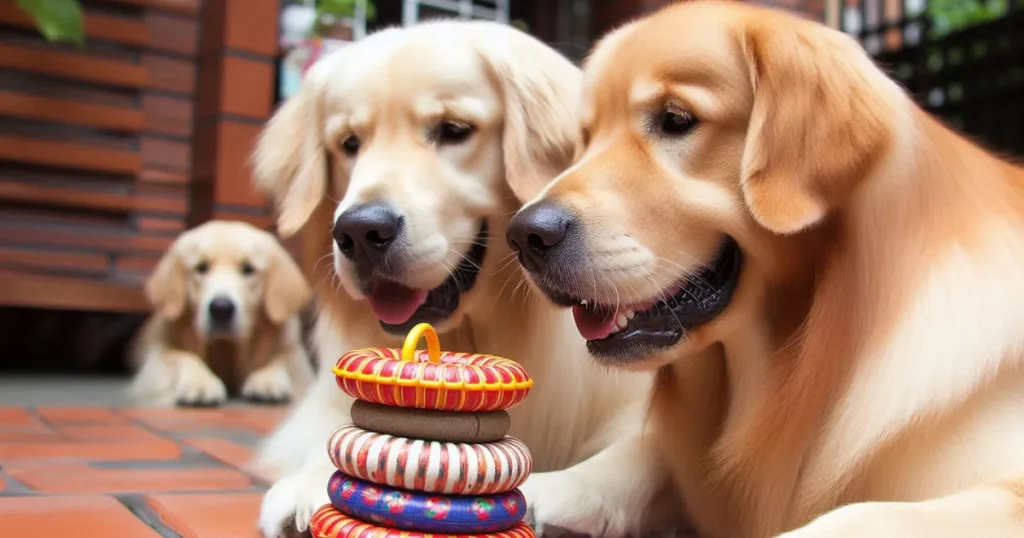
Obedience Games That Encourage Interaction:
Games like “Find It,” “Follow the Leader,” and “Red Light, Green Light” are perfect for reinforcing basic commands during socialization. These activities help Golden Retrievers focus and respond to cues, even in stimulating environments.
Scented toys and puzzles for mental stimulation:
Scented Toys, such as hiding treats around the house or yard, mentally stimulate your dog and encourage them to explore and interact with their surroundings. Puzzles are also a great way to keep them occupied while they learn to stay calm and focused.
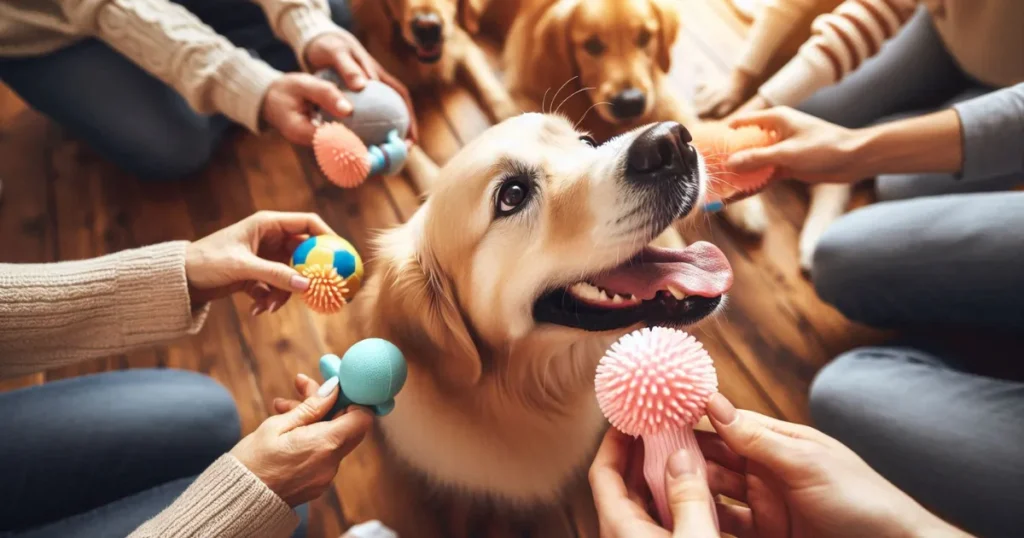
Social Environments: Parks, Playgrounds, and Dog Daycares
Choosing the right socialization environment is crucial to your Golden Retriever’s development. Below is an overview of the most common environments and their benefits:
Dog Parks and Individual Play Areas:
Dog parks provide the opportunity to interact with different breeds of dogs, which can be beneficial for confident and well-socialized dogs. However, they can be intimidating for shy or skittish Golden Retrievers. In contrast, playdates are a time for children to play individually, allowing for more controlled interactions. This way, good behavior can be encouraged without creating chaos in a large group.
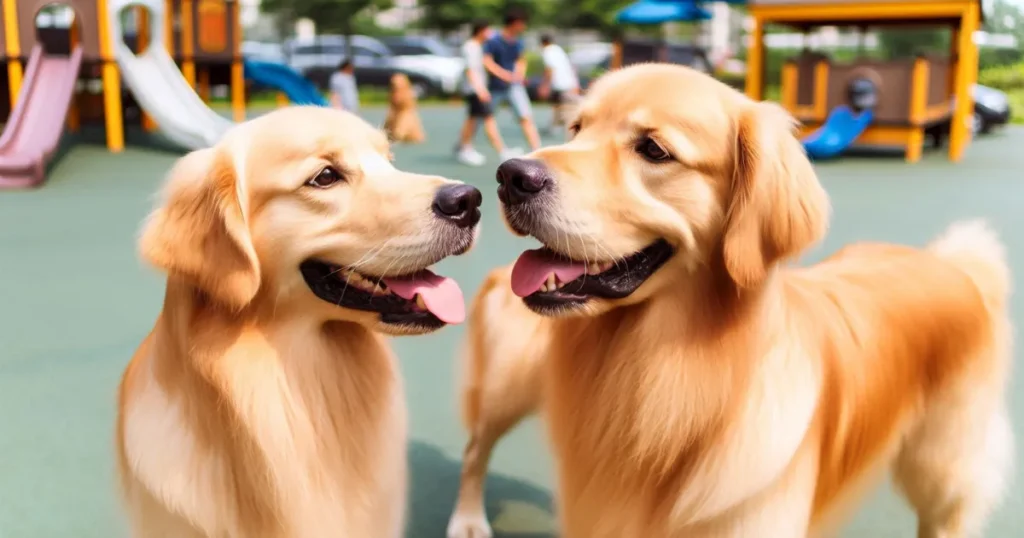
Choose the Right Daycare or Preschool:
Not all daycares and playgroups are created equal. Look for facilities with experienced staff who can effectively supervise dog behavior. Please ensure that all dogs involved are vaccinated and temperament tested to minimize the risk of conflict or injury.
Provide a positive experience in public places:
When visiting parks or public places, keep the first few visits short and pay attention to your dog’s body language. Reward calm behavior and redirect your Golden Retriever if he becomes overly excited or restless. Gradually increase the length of visits as your dog becomes more comfortable.
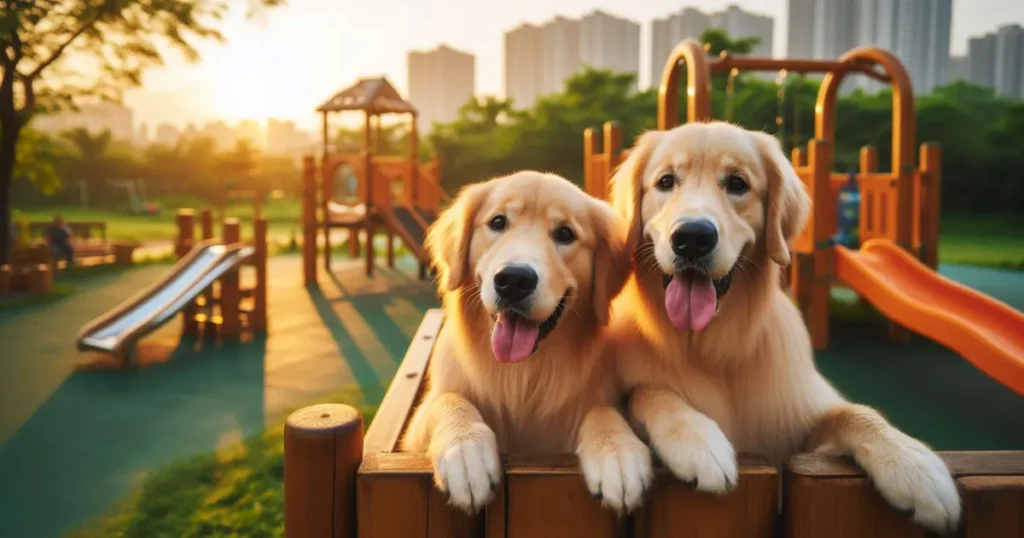
Monitor Progress and Adapt Methods
It’s important to monitor your Golden Retriever’s socialization progress to ensure they’re on track. Here’s how you can effectively monitor and adjust your approach:
Monitor Progress:
Observe how your dog responds to different types of socialization. Are they becoming more confident around other dogs? Are they staying calm in busy environments? Record each interaction to identify patterns and areas for improvement.
Adapt Methods:
If your Golden Retriever shows signs of anxiety or overexcitement, you may need to adjust your approach. For example, if they become nervous around other dogs, choose a quieter environment with fewer distractions. Gradual introductions and positive reinforcement can make a big difference.
Seek professional help:
If you suffer from persistent anxiety, aggression, or extreme shyness, it may be worth consulting a professional trainer or behaviorist. You can provide your Golden Retriever with individualized recommendations to help address specific socialization issues.
Conclusion
Socializing Golden Retriever dogs plays a crucial role in raising a balanced and confident companion. From puppyhood to adulthood, regular exposure to new people, pets, and environments helps prevent behavioral problems and promotes a stable temperament. If you start Socializing Golden Retriever puppies early and continue consistently, you can be confident your dog will grow into a calm, friendly, and well-adjusted family member. Remember, every dog develops at its own pace, so be patient and adjust your approach as needed. Do you have questions or personal experiences with Socializing Golden Retriever? Share them in the comments — we’d love to hear your stories!
Dr. Nabeel A.
Hi, I’m Dr. Nabeel Akram – a farm management professional by trade and a passionate Golden Retriever enthusiast at heart. With years of experience in animal science and livestock care, I’ve built a career around understanding animals—how they live, thrive, and bring value to our lives. This blog is a personal project born from that same passion, focusing on one of the most loyal and lovable breeds out there: the Golden Retriever. Whether I’m managing farm operations or sharing insights on canine health, behavior, and care, it all ties back to one core belief—animals deserve thoughtful, informed, and compassionate attention. Welcome to a space where professional expertise meets genuine love for dogs.
Facebook |
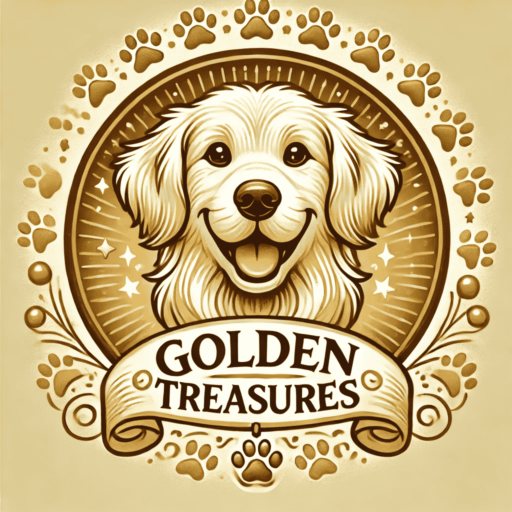

Links will be automatically removed from comments.